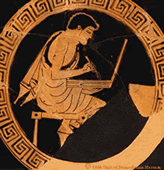
History of Philosophy: Ancient Syllabus
| Course 650:100g |  | Professor Margaret Holland |
| Office Hours: | Office: Baker 146 | |
| TTh 12:45-1:30 | Office Phone: 273-5975 | |
| and by appt. | Dept. of Philosophy & Religion. | |
| Email: margaret.holland@uni.edu | Baker 135 | |
| Download Syllabus | Dept. Phone: 273-6221 |
Spring 2006 Syllabus
Course Description:
The discipline we
know as 'Philosophy' finds its source in thinkers who lived in Greece after the
7th century B.C. Our first goal in this course will be to begin to understand
the types of questions about the world, nature, and reality that were asked in
the 7th, 6th and 5th centuries B.C. by thinkers now known as
'pre-Socratics.' We will then examine the role of Socrates in turning attention
from physical nature and the cosmos toward human life and conduct. Plato
continued Socrates's project and developed a metaphysical system to support the
claims made by Socrates about what constitutes a good human life. By reading
Plato's Republic students will have the opportunity to study Plato's
metaphysics, epistemology, ethics and politics. This work is the first
presentation of a complete philosophical system in Western history.
Following the Republic, we will read sections of Aristotle's work selected so as to show students his response to earlier thinkers, as well as his own approach to philosophy that is both unique and a continuation of what preceded him.
Ancient Greek philosophy is of such a profound and subtle nature that the best minds of the past two thousand years have studied, interpreted, criticized and praised it. Ancient Greek thinkers set the standard and laid the foundation for all Western philosophers. The purpose of this course is not only to help students become familiar with this period of philosophical history, but also to show students that at least part of the reason that these thinkers have found such a responsive echo down through the centuries is because the questions they formulated are both fundamental and wide-ranging. That is why they continue to speak to us.
| Required Text: |  |  |  |  |  |  |  |
| Readings in Ancient Greek Philosophy: From Thales to Aristotle, ed. Cohen, Curd, Reeve (Hackett) |
Reading assignments:
Readings in
Ancient Greek Philosophy: From Thales to Aristotle:
Introduction (pp. viii-ix & 1-6)
The
Pre-Socratics
The Milesians
Thales
Anaximander
Anaximenes
Heraclitus
Parmenides
Plato
Republic
Books: I, II, III, IV, V, VI (line 503 to end),
VII
(beginning to line 522), X
Aristotle
Nicomachean Ethics:
I:1-5, 7-9, 13; X:6-9
Politics:
I:1-3; II:1-5
Categories:
all
Physics:
I:1, 5-9; II: 1-7
Metaphysics:
I: 1-3; IV: 1-3; XII: 6-7
Course Requirements:
(1) Students are expected to attend and participate in all class meetings, as well as read all assignments. If you miss a class meeting, it is your responsibility to contact another student and to get the assignment and class notes. You need to make-up missed work before the next class.
(2) Each student will pursue a research project on a topic in ancient philosophy. After selecting a topic, the student will prepare three written assignments. The assignments are described below. Points will be deducted for late assignments.
(3) There will be two tests during the term, and a final exam. There will be no make-up tests unless appropriate documentation of a legitimate reason for missing the test is provided. Legitimate reasons for missing a test are limited to things such as: jury duty, accident, illness. All non-emergency requests for make-up tests must be given to the instructor in writing at least two weeks prior to the test date. Emergency requests for make-up tests must be made (either on the phone or through e-mail) no later than the morning of the test. If these requirements are met, the instructor may consider providing a make-up test.
** Please familiarize yourself with UNI's Academic Ethics Policies. These policies are in the student handbook, and they can be found on-line. Search "academic ethics" on UNI's home page and you will be directed to a number of sites that explain your responsibilities on this matter. UNI's policy states that cheating and plagiarism are "unacceptable" and that an instructor may take further disciplinary action against any student who violates academic ethics. In accordance with this policy, students who cheat or plagiarize will receive a grade of "F" for the entire course.
| September 29 | - 16% of the grade |  | |
| Nov. 3 | - 20% of the grade | ||
| Final Exam | - 30% of the grade | ||
| Research Report | - 10% of the grade | ||
| Annotated bibliography | - 10% of the grade | ||
| Paper | - 14% of the grade |
Tests will cover the readings and class lectures. Tests will consist of essay questions. All tests will be comprehensive.
On Thursday September 15th class will be held in Rod Library.
Research Project Requirements:
(1) research report:
The research report should be typed, double-spaced, and include your name and the course title.
Your research report should include a 200 word description of your topic. The description should include the names of philosophers you will use, and a description of the issues on which you will focus. Also, include information about questions you have concerning your research and whether you will be working with other students.
The second part of your research report should include the following information: a list of encyclopedias and indexes you have used in your research, a list of the terms you have used in your research, and a report (including volume and page numbers) about what you found in each source. [For example: Encyclopedia of Philosophy, Edwards, ed.; searched Plato, justice, soul, state; found the following entries which look useful and had good bibliographies... I have put in ILL requests for…. I have copied… I have signed out of the library…]
Each student must use the following reference works and must include them in the research report. Additional reference works may be used and may be included in the report.
The Encyclopedia of Philosophy, Paul Edwards, ed. Ref. B51.E58
Routledge Encyclopedia of Philosophy, Edward Craig, ed. Ref. B51. R68 1998
Philosopher’s Index [electronic resource]
(2) annotated bibliography:
The bibliography must be typed.
It should include no less than four articles or books which were the main sources for your research (other than assigned reading and not including reference works). Web sources should not be among your four main sources. Also, do not include encyclopedias among your four sources. The four main sources must be philosophical.
For each source write two paragraphs containing the following information: describe the source in general (i.e. provide an overview of the source), the specific use you made of it, what it contributed to your research, and which pages you read.
For the bibliography format use The University of Chicago Manual of Style or the MLA Style Sheet (see the Reference section of the library).
(3) paper:
The paper must be typed, double-spaced.
The paper should be written in complete sentences, not in outline form.
Summarize your research. Include (1) a general introduction to your topic, (2) a list of the main points you will discuss, (3) a discussion of each point, (4) your conclusion, and further questions. Each paper should begin with a paragraph stating: “The topic of my research is …,” then continue “…specifically I will discuss…,” “The main points I will cover are…”
The paper should be about six pages long.
Include a cover sheet with the following information:
instructor's name, student's name,
research
title. Also, include an updated, corrected version of your annotated
bibliography.
Staple together the cover sheet, paper, and annotated bibliography.
Points will be deducted if any part of the written work is late. One point per day will be deducted for each part of the written assignment which is handed-in late. Also, research reports must be handed-in in order to receive credit for bibliographies and papers, and bibliographies must be handed-in in order to receive credit for papers.
Research Topic:
The
following are among the research topics which would be appropriate for this
course.
*
Pythagoras, especially music and math
*
the Stoics, Epicureans or Sceptics
*
women thinkers of ancient Greece
* a
Platonic dialogue that we will not cover, e.g. the Symposium
*
Plotinus and Neoplatonism
*
aspects of Aristotle's work we will not cover
Extra Credit Option:
Students may receive extra credit for using the UNI Writing Center to improve the quality of their research projects. A total of six additional points will be available through this option. Specific information about the extra credit option will be provided in September.
Secondary Sources:
There are
many excellent secondary sources for ancient Greek philosophy. This list
represents some of the sources with which I am familiar. I encourage you to
select some of these to assist you during the semester. Also, if you go to my
web site you will find some helpful links. (http://fp.uni.edu/holland/)
Roy Adkins
Handbook to Life in Ancient Greece
Jonathan Barnes Aristotle
Jonathan Barnes Early Greek Philosophy
Albert Bell and James B. Allis Resources in Ancient Philosophy: An
Annotated
Bibliography of Scholarship in English, 1965-1989
John Burnet Early Greek Philosophy
Frederick Copleston A History of Philosophy
F.M. Cornford Before and After Socrates
Edward Craig Routledge Encyclopedia of Philosophy
Richard T. De George A Guide to Philosophical Bibliography and
Research
Richard T. De George The Philosopher’s Guide to Sources, Research
Tools,
Professional Life, and Related Fields
Walter Donlan The Classical World Bibliography of Philosophy,
Religion, and Rhetoric
Paul Edwards Encyclopedia of Philosophy
John Finley Four Stages of Greek Thought
Hans-Georg Gadamer The Idea of the Good In Platonic-Aristotelian
Philosophy
Marjorie Grene A Portrait of Aristotle
W.K.C. Guthrie A History of Greek Philosophy
Martin Heidegger Early Greek Thinking
Karl Jaspers Plato and Augustine
G.S. Kirk & J.E. Raven The Pre-Socratic Philosophers
Richard H. Lineback The Philosopher’s Index
G.E.R. Lloyd Early Greek Science
J.V. Luce An Introduction to Greek Philosophy
R.G. Mulgan Aristotle's Political Theory
Iris Murdoch The Fire and the Sun
********************************
The Americans with Disabilities Act of 1990 (ADA) provides protection from
illegal discrimination for qualified individuals with disabilities. Students
requesting instructional accommodations due to disabilities must arrange for
such accommodation through the Office of Disability Services. The ODS is
located at: 213 Student Services Center, and the phone number is: 273-2676.